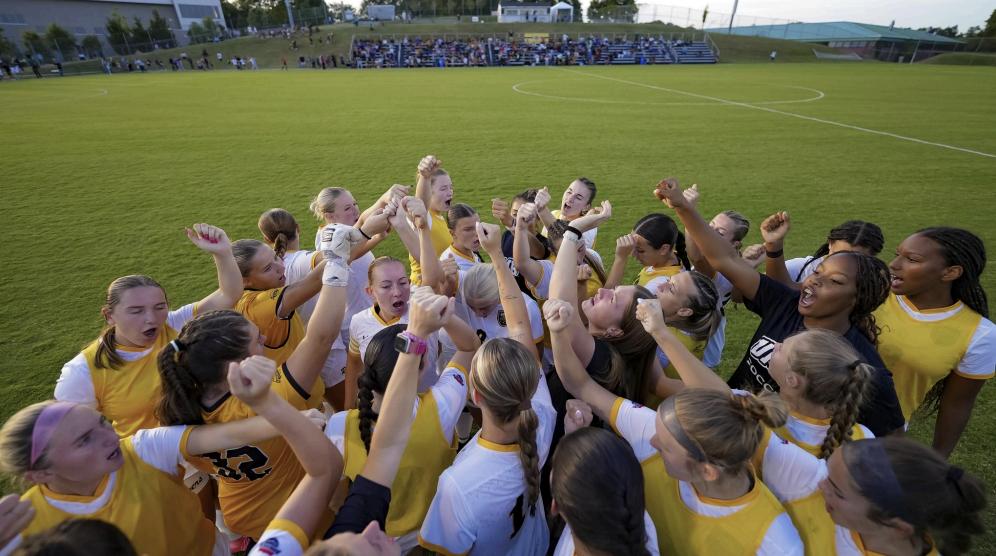The red and white stripes of the American flag stood out against the blue, cloudless sky as UMBC police officers lowered it and the Maryland flag to half-mast outside the University of Maryland, Baltimore County’s Administration Building on Friday, September 10. As the officers tied off the flags, UMBC Naval Science Reserve Officers’ Training Corps cadets saluted at attention, Emergency Health Services students held a banner of the American flag that read “Flag of heroes” and firefighters from the Halethorpe and Arbutus Volunteer Fire Department stood onlooking.
After a moment of silence, where you could only hear the sound of the wind and flags snapping, Executive Director of the Office of Equity and Inclusion Candace Dodson-Reed spoke:
“On September 11, 2001, at 8:36 a.m., hijackers deliberately crashed Flight 11 and Flight 93 into the twin towers of the World Trade Center.”
She goes on and states the toll of the terrorist attack: 2,977 people died in the initial attack, 412 of whom were New York City firefighters, paramedics, police officers and other emergency workers.
For most undergraduate students, 9/11 is a historical event. Even the oldest among this year’s senior class were only babies when the attacks occurred. However, many who remember the attacks feel the residential trauma more acutely as this year marks their twentieth anniversary.
“20 years. It’s a long time for something to be etched into your memory, etched into America’s memory,” said Captain Doug Simpkins of the Arbutus Volunteer Fire Department.
UMBC’s EHS Clinical Coordinator Garry Williams remembers sitting in Sherman Hall as an EHS student himself. As he learned about the responsibilities of emergency personnel, he watched paramedics plunge into the crumbling towers.
“It’s still personal 20 years later,” said Williams.
Chief of UMBC Police Paul Dillon worked at the University of Maryland, College Park when 9/11 happened. He recalls the terror that gripped the campus, particularly after the third plane— Flight 77— hit the west end of the Pentagon in Washington D.C. less than 20 miles away. He recalls even more vividly the willingness of all emergency responders, both those in New York and D.C., to throw themselves into danger.
“[Those first responders in New York City and D.C.] would do it again because that is what we do in emergency services. It is who we are,” said Dillon.
While remembering the trauma caused by 9/11, Vice President of Student Affairs Nancy Young also remembers the kindness of others as the entire country collectively grieved.
However, those 2,977 deaths do not capture the true death toll of 9/11. 20 years later, 9/11 is still claiming lives. The Justice Department has received claims of an additional 3,900 people who died of 9/11 related illnesses as recently as Tuesday, September 7. These illnesses stem from toxic fumes and particulate matter that first responders and bystanders inhaled as the towers fell.
Even the additional 3,900 lives lost were not all that the UMBC administration recognized. As a result of post-9/11 politics, lives across Iraq, Pakistan and Afghanistan were lost. Particularly evident in recent news are the lives lost due to America’s involvement in, and subsequent withdrawal from, Afghanistan.
America’s involvement in Afghanistan began in September 2001, only seven days after 9/11, when then-President George W. Bush signed a joint resolution that gave the U.S. legal grounds to invade Afghanistan later that year. Over the next 17 years, the U.S. used airstrikes and ground combat to promote democracy in Afghanistan. However, its primary goals were to eliminate Al-Qaeda — the militant and eventual terrorist organization lead by Osama Bin Laden that claimed credit for 9/11— and then the Taliban — an ultraconservative militant political and religious faction that now controls Afghanistan.
America spent its last three years in Afghanistan trying to get out of the war. In 2019, former President Donald Trump announced the removal of 7,000 U.S. troops in Afghanistan as part of a peace agreement with the Taliban. When President Joe Biden took office, he announced a complete withdrawal from Afghanistan by September 11, 2021. By the end of August 2021, all American forces and embassy personnel had left the country.
While Afghans died throughout the 20-year war, their recent deaths earned more publicity. Coverage of Afghans clinging onto U.S. plane wheels and falling to their deaths, articles describing the victims of a suicide bombing at the Kabul Airport and other recent news of lives lost in Afghanistan sting of a cause-and-effect sequence for UMBC administration.
“Every incident is in the context of history. There is a history that predates 9/11 and a history after 9/11, and it is all interconnected,” explained Young.
“The decisions our government makes affect lives all over the world,” said Dillon.
While no one could begin to answer the complex political questions posed by the U.S.-Afghan war, all felt for the country and its citizens.
“I empathize with Afghan refugees,” said Dodson-Reed. “It’s hard to watch. I was hopeful peace would win.”

